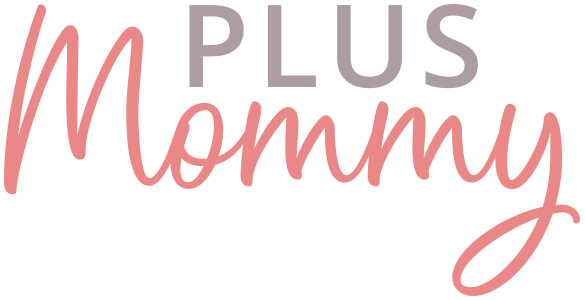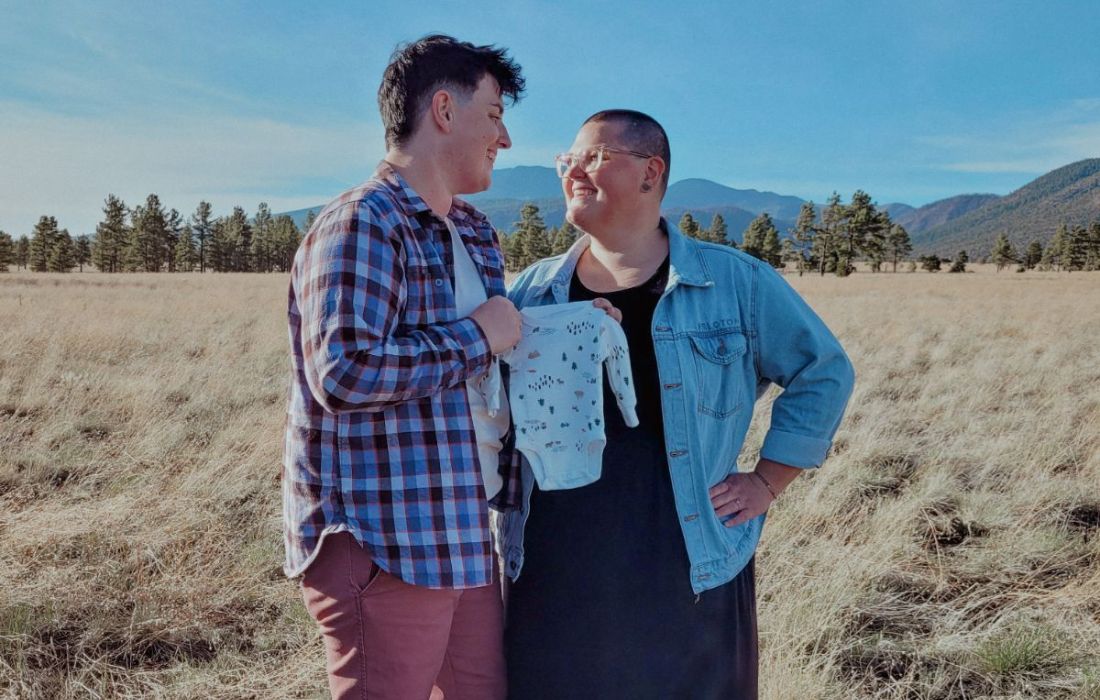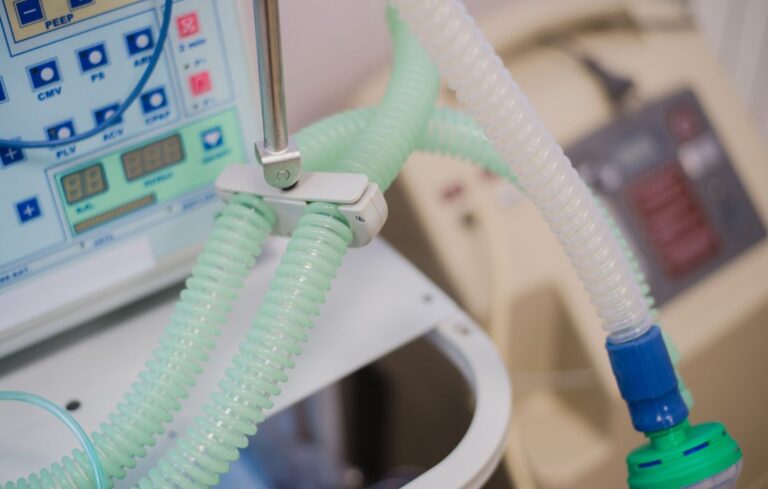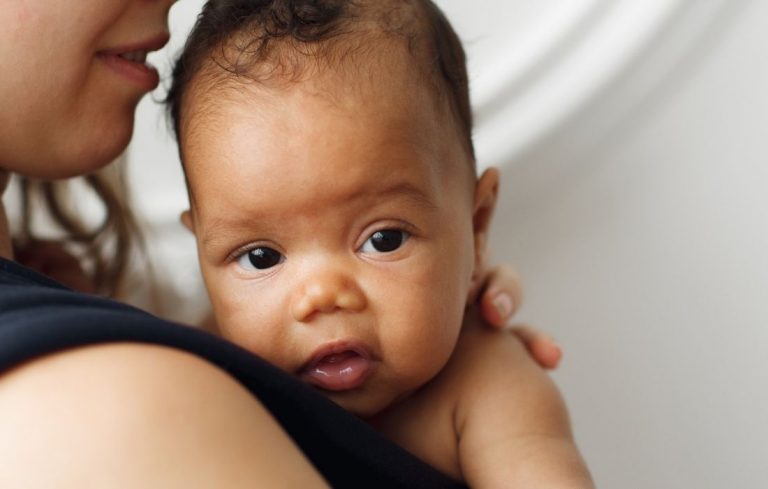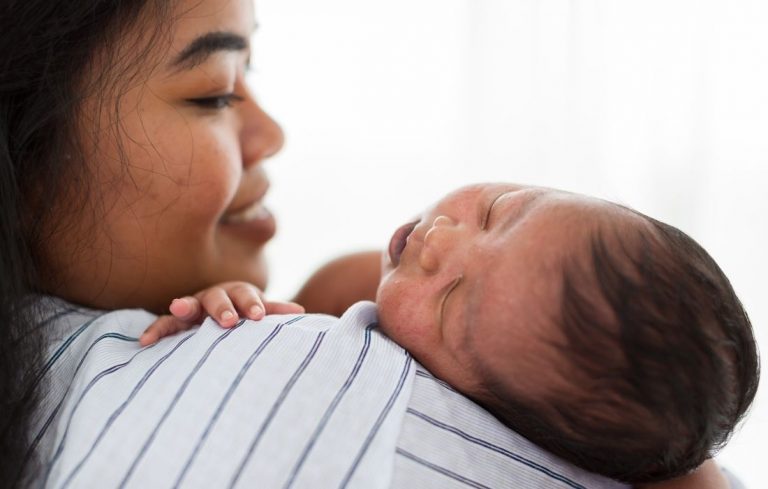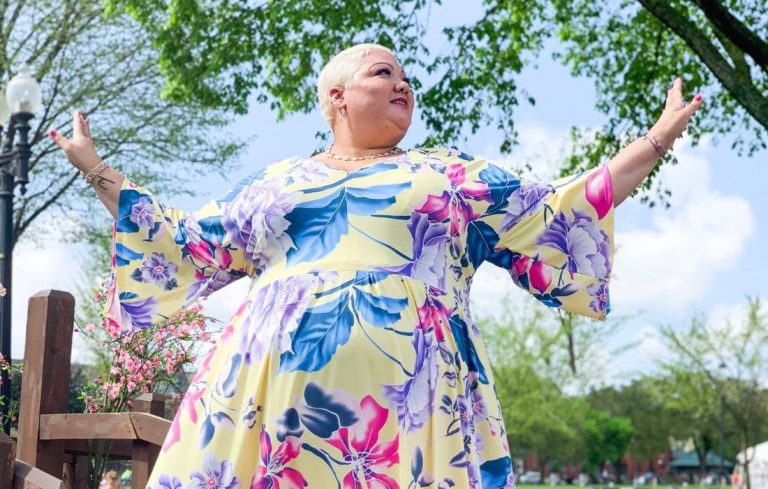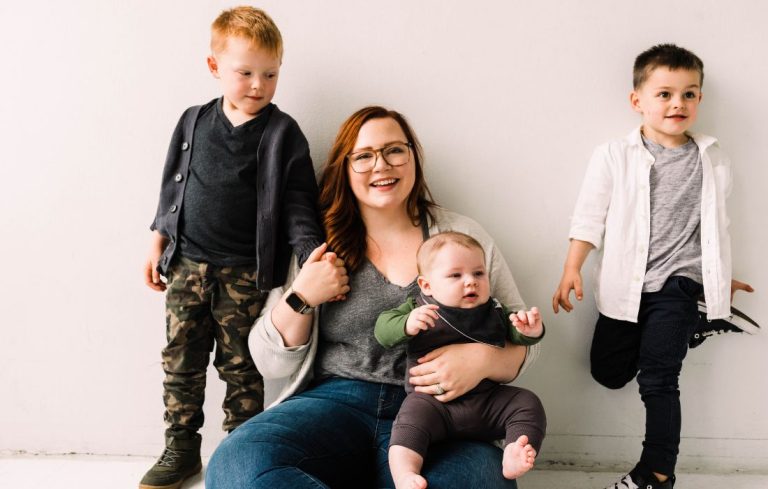A Queer Plus Size Birth Story of Strength, Resilience, and Love
Maria and Erica’s journey to parenthood began with a focus on conception as a queer couple. However, once Maria became pregnant, she faced the challenges of navigating pregnancy, the healthcare system, and societal expectations as a fat and queer person with an emphasis on being fat. Their story is a remarkable blend of joy, advocacy, resilience, and love that is truly unforgettable.
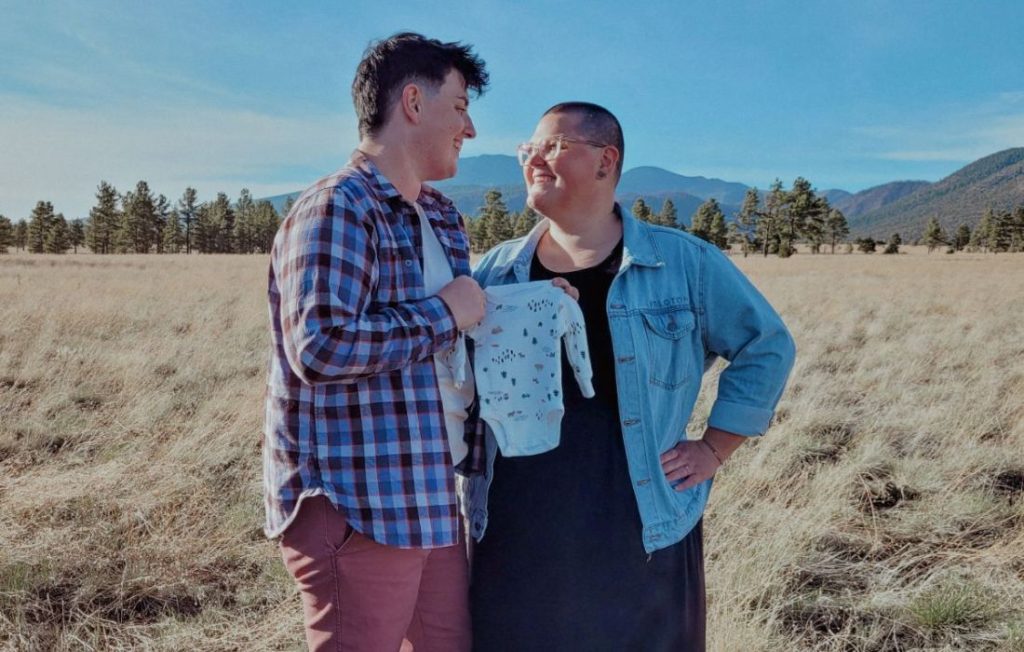
Queer Plus Size Birth Story
Amidst the pandemic, Maria and Erica tied the knot at a time when everyone seemed to be embracing the art of bread baking.
Maria immersed herself in The Queer Family Podcast, pondering having a baby but thinking their plate was already full. But, in time, a strong desire emerged within her, and she approached Erica, expressing her readiness to start a family.
The decision for Maria to carry their child was an easy one. Then they began exploring their fertility support options once they felt ready, grounded, and excited.
As a queer couple, finding places where they’d feel safe was extremely important. And being new to Arizona, they needed to do their research.
One of the first steps along their parenthood journey was selecting a donor from a sperm bank, as they didn’t want to have a known donor. It was an emotional and exciting process where they had deep conversations about what was important to them.
One notable aspect that influenced the decision-making process was a heartfelt letter from their chosen donor addressed to prospective parents.
With the sperm donor selected, it was time to start trying to conceive. They opted first for intracervical insemination (ICI) at home. They closely watched Maria’s fertility window and tried a few times.
The emotional toll was significant each time their attempts didn’t succeed. Maria couldn’t help but feel a sense of personal failure, despite being aware of the low odds of achieving pregnancy through ICI.
Erica, too, experienced the pressure of ensuring they followed all the right steps during the insemination process. On top of it all, the financial burden added to their stress, with each attempt costing around $1,000 due to the expense of purchasing sperm.
Fertility Support
Maria and Erica felt it was time to get fertility support. They connected with a fertility clinic thanks to finding LGBTQIA+ supportive providers via an LGBT TTC Facebook group.
They felt heard and supported during their first Zoom consultation with an OB-GYN. Maria thought they needed to jump straight to IVF, but this provider felt IUI was an excellent first step.
And so they started the IUI process!
Maria expressed gratitude for the absence of comments regarding her weight potentially affecting their chances of conceiving. And throughout all her appointments at the fertility clinic, she never once had to step on a scale, which was a relief for her.
Their very first attempt at IUI led to a beautiful outcome – they were pregnant!
Maternity Care
Maria remained under the care of the fertility clinic until she reached her 8th week of pregnancy. Then the time came for her to transition to routine maternity care, marking a significant shift in her healthcare journey.
Unfortunetly, the limited options for maternity care providers in Flagstaff, Arizona, left them with only two choices.
Maria had an extremely negative experience before getting pregnant with one of the two. She endured fat-shaming during a pap smear, leading her to rule out that provider completely.
Luckily, Erica’s involvement in public health provided her with connections to some of the staff at the other available maternity care option. Based on her interactions with them, Erica believed the clinic was LGBTQIA+ friendly. However, they still had an important question: whether the clinic would be size-friendly.
Before her first appointment with this new clinic, Maria talked to Erica about what was important to her for the birth. Maria did not want to be induced or have a cesarean birth.
The initial appointment went smoothly, and the new clinic welcomed them as a queer couple. However, Maria noticed a particular emphasis on her size and associated risks. As a result, additional appointments and tests were ordered, including several nonstress tests.
As Maria approached the final stages of her healthy pregnancy, a midwife they had grown fond of began discussing the possibility of inducing labor.
Determined to let labor progress naturally, Maria took every possible measure to encourage natural labor induction.
Erica and Maria had also hired a team of doulas to support them throughout this journey. And their doulas played a significant role in supporting and guiding Maria and Erica through decision-making.
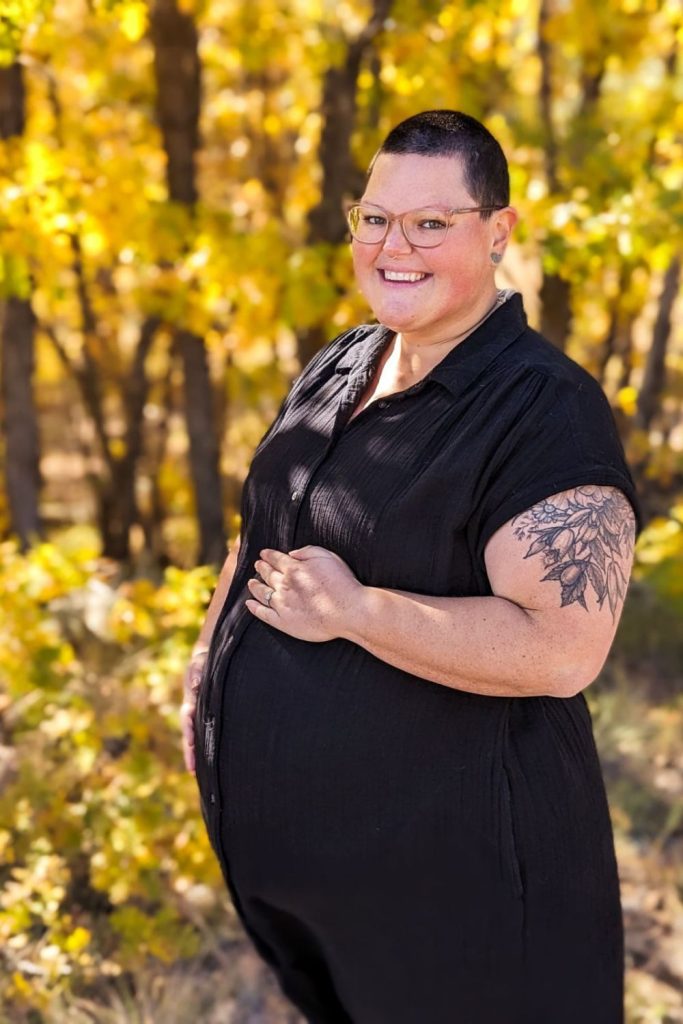
Induction Day
Maria and Erica decided to proceed with an induction at 39 weeks, knowing that their chosen midwife would be present for the birth. They were grateful to have a midwife who was LGBTQIA+ friendly, ensuring a supportive and inclusive environment during this significant moment in their lives.
During the first day and a half, Maria was on medication to start the dilation process, and they tried to place a Foley catheter. But her body wasn’t progressing, and the pressure was on for more medical interventions, including Pitocin.
At this point, Maria’s water hadn’t broken, and the baby was doing great. So, their doula suggested that she and Erica consider heading home. They had concerns about how others would perceive their decision. But, their worries eased when a nurse echoed the same advice and mentioned that their midwife’s shift was ending.
Knowing they could safely leave since Maria and the baby were fine, they packed up and headed home.
Once home, they were still trying to do everything to naturally induce labor and going to non-stress tests to ensure their baby was doing well as Maria’s pregnancy was entering the 40th week.
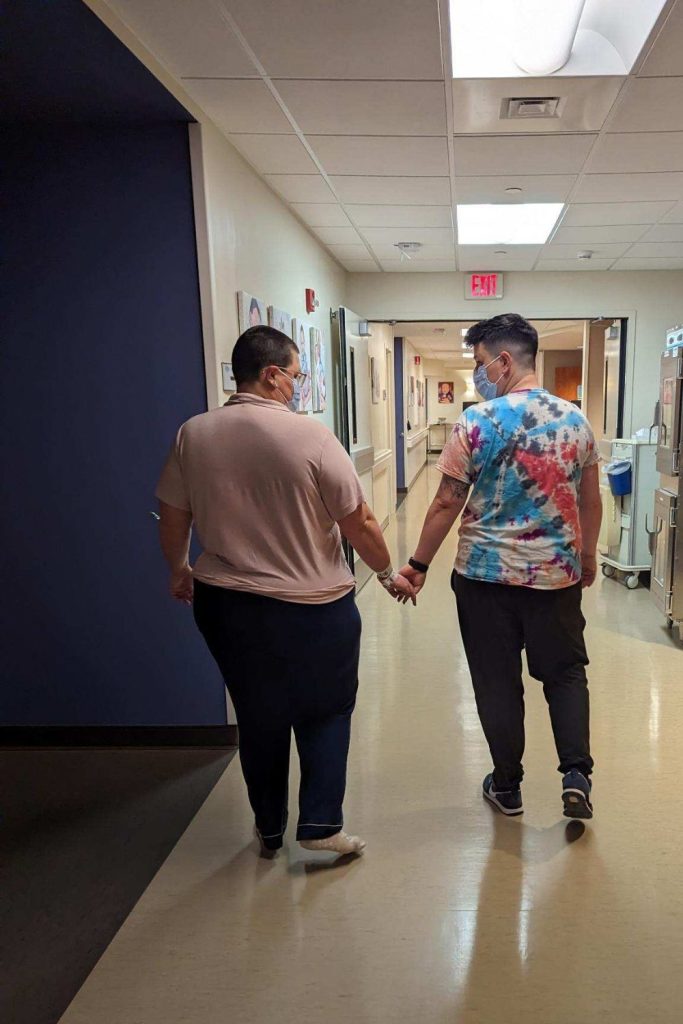
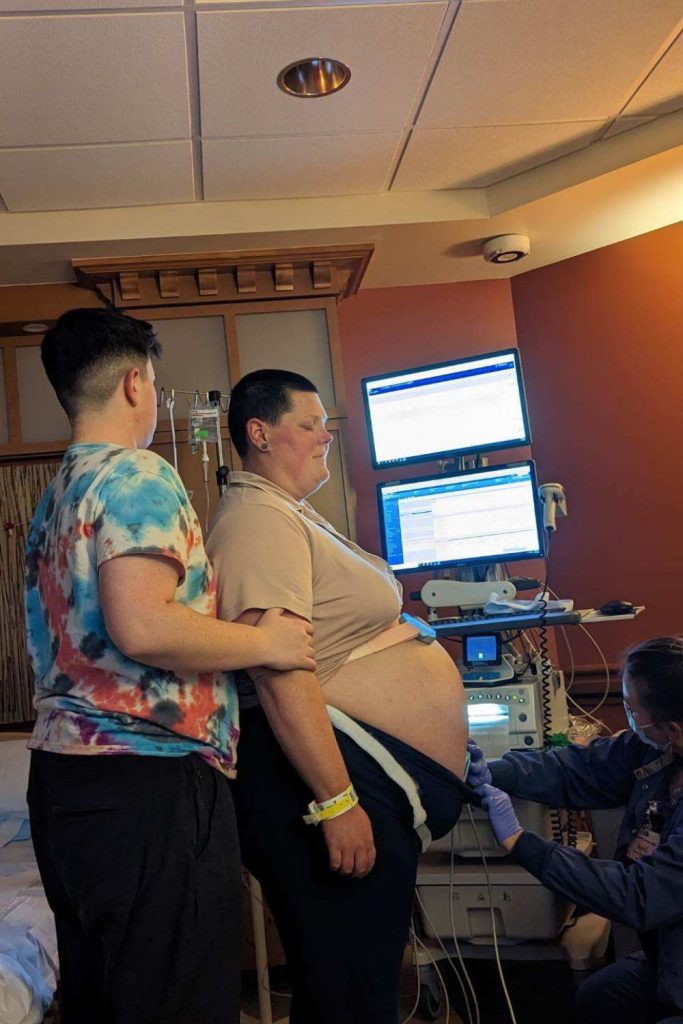
Induction Day Number Two
At 41 weeks, Maria’s second induction was scheduled. She started the gradual induction process over a few days, following a similar approach as before.
Their midwife was there again for this induction and started pushing for Pitonic before Maria felt ready. The midwife also commented that Maria’s body couldn’t do it on her own.
At that moment, Maria felt her trust in this provider was broken as there was no medical urgency to proceed with Potocin.
Thankfully, that same nurse from the first induction was present and helped to advocate for more time and other medication.
Erica did all she could to support her wife. They were both sleep-deprived while advocating for a birth with as little intervention as possible.
Time became a blur, and that midwife’s shift ended.
At some point, an OB-GYN suggested breaking Maria’s water. With consent given, Maria understood they now had approximately 24 hours to welcome their baby, prompting the decision to contact their doula for support during this critical time.
Unfortunetly, Maria’s body didn’t go into labor even with her water broken, so it was time for Pitocin. And eventually, with strong contractions finally happening, Maria was exhausted and knew she needed an epidural.
Once she received the epidural, everyone rested for a couple of hours. Then Maria pushed for three hours, with the support of Erica and her doula, before bringing beautiful baby Rune into the world!
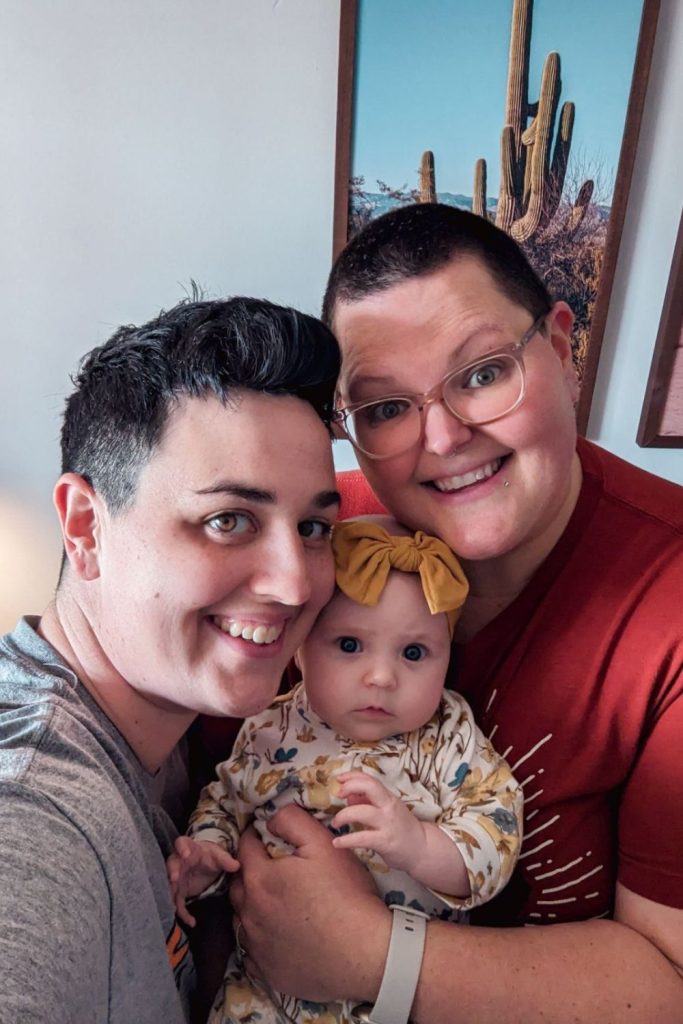
Tune in to episode 204 of the Plus Mommy Podcast, where Maria and Erica candidly share their remarkable queer plus size birth story.
Recording & Show Notes: Plus Mommy Podcast Episode 204
Transcript happily provided upon request.
Resources Mentioned On The Show
- The Queer Family Podcast
- Listen to more queer plus size birth stories via the Plus Mommy Podcast or read stories via the Plus Size Birth website.
- Connect with Maria and Erica via Maria’s Instagram.
Thank you to our sponsor:

Our friends at Aeroflow Breastpumps are the sponsor of this week’s episode. Aeroflow Breastpumps is our go-to partner in ensuring moms get top-notch breast pumps, milk storage bags, breastfeeding prep courses, and more for little to no cost through insurance.
They have a fantastic range of highly-rated breast pumps from brands like Medela, Spectra, and Motif. All you need to do is complete a straightforward insurance eligibility form, and they’ll take care of the rest. Easy, peasy!
Hop over to aeroflowbreastpumps.com/plussizebirth and see why over 1 million families have chosen Aeroflow Breastpumps to cover their pump through insurance.
